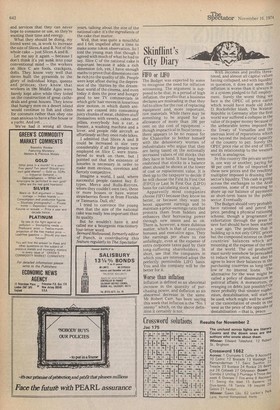Skinflint's City Diary
FIFO or LIFO
The Budget was expected by some to recognise the need for inflation accounting. The argument is supposed to be that, in a period of high inflation, the profits that a business declares are misleading in that they fail to allow for the cost of replacing equipment and, more important, raw materials. While there may be something to be argued for an allowance of more than 100 per cent on the cost of equipment — though impractical in fiscal terms — there appears to be no reason for the Chancellor to bother himself with the delusionary worries of industrialists who argue that they are being taxed on the notionally increased values of old stocks that they have in hand. It has long been enshrined that stocks in a balance sheet should be shown at the lower of cost or replacement value. It is then up to the taxpayer to decide if he will choose the First In First Out (FIFO) or Last In First Out (LIFO) basis for calculating stock value.
Apparently most comp'anies choose FIFO because they know no better, or because they want to boost apparent earnings and to maintain a price-earnings ratio that protects them from bidders and enhances their borrowing power through new, issues and so on. There is, however, a more dubious matter, which is that of executive bonuses and executive egos. They like earnings per share to rise unfailingly, even at the expense of extra corporate taxes paid by their long-suffering shareholders. In short, see that the companies in which you are interested adopt the perfectly permissible LIFO basis. You and the company will be the better for it.
Worse than inflation
Inflation is defined as an abnormal increase in the quantity of purchasing power, and deflation as an abnormal decrease in the same. Mr Robert Carr, has been saying this week that inflation is the "No. I enemy" which, on the above definition it certainly is not.
With incomes and profits threatened, and almost all capital values having collapsed, and with liquidity in question, it does not seem that inflation is worse than it always is in a system pledged to full employment. Surely the worst thing we face is the OPEC oil price cartel which would have made old John D. Rockefeller blush. The Weimar Republic in Germany after the first world war suffered a collapse in the value of its paper money because of the unbearable terms imposed by the Treaty of Versailles and the onerous level of reparations which was beyond the industrial capacity of the country to pay. Surely the OPEC price rise at the end of 1973, and its relationship to the western world, is analagous.
In this country the private sector is, one way or another, paying for 80 per cent of the oil imported at these new prices and the resulting multiplier imposed is draining that sector's liquidity. This cash is going across the exchanges to the Arab countries, some of it returning to shore up our balance of payments as short-term loans to the public sector. Eventually
The Budget should very probablY have rationed oil and petrol by price, pending a physical rationing scheme, though a programme of exhortation through the press to save fuel should have been started a year ago. The problem that is building up is not only OPEC prices but the compound interest on these countries' balances which are mounting at the expense of the rest of the world. The oil producers must surely somehow be persuaded to reduce their prices, and also to agree to leave their balances in the purchasing countries as long-ter low or no interest loans. The alternative for the west might be called a policy of dissimulation in political affairs, A moratorium, or reneging on debts just possibly? Or more probably that sinister euPile" mism, destabilisation, will start to be used, which might well be aimed at the cancellation of credit in the west as the price of the opposite of destabilisation — that is, peace.


































 Previous page
Previous page